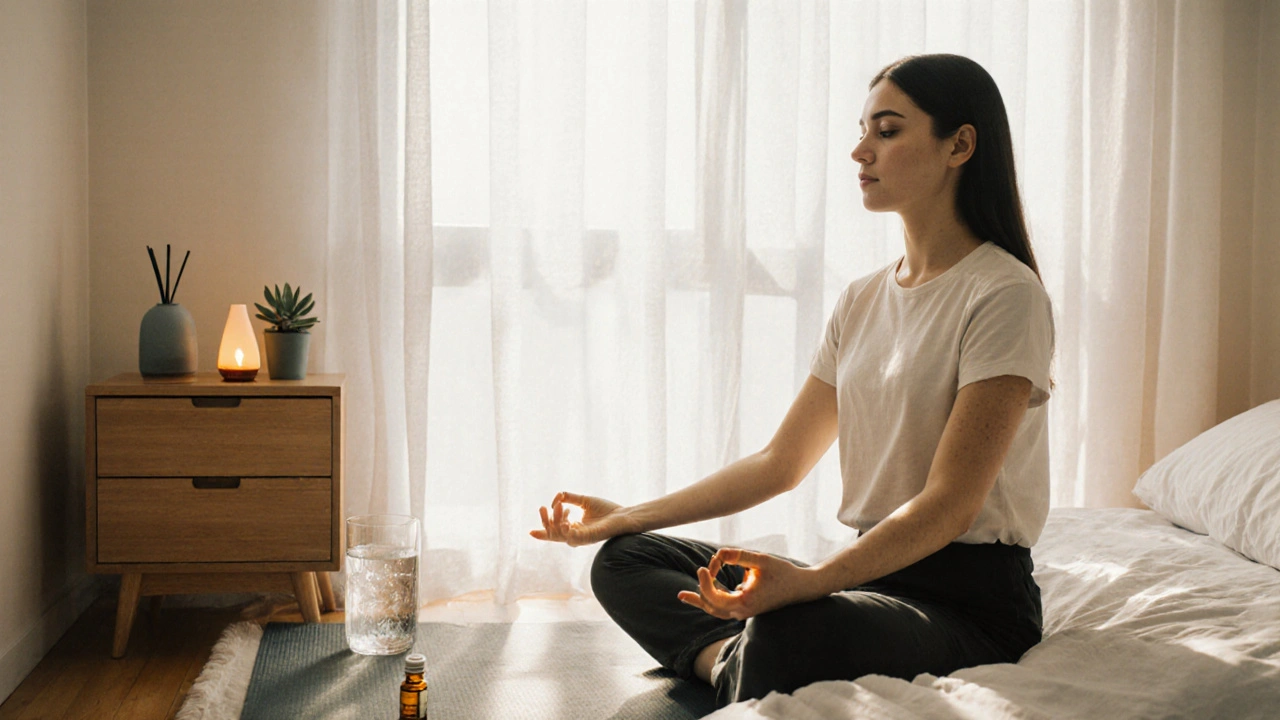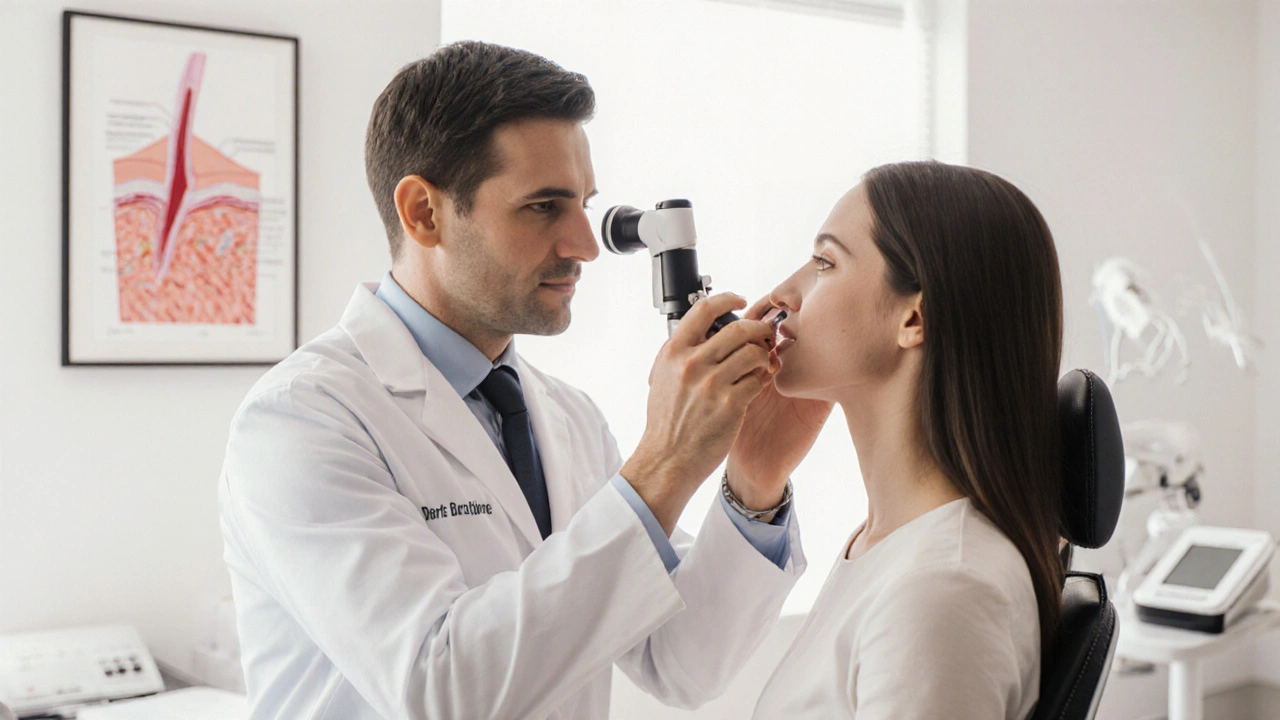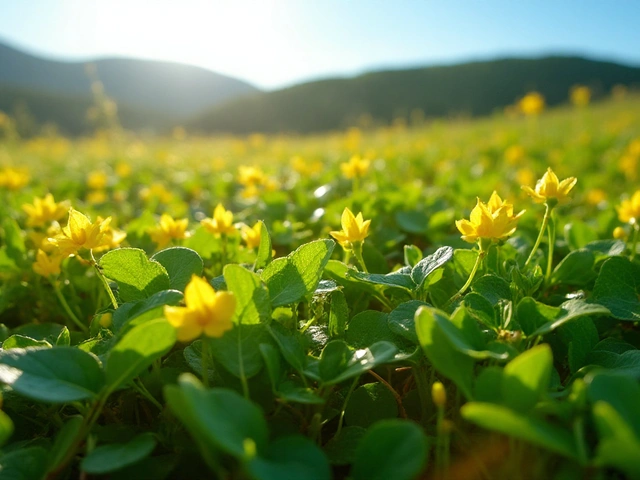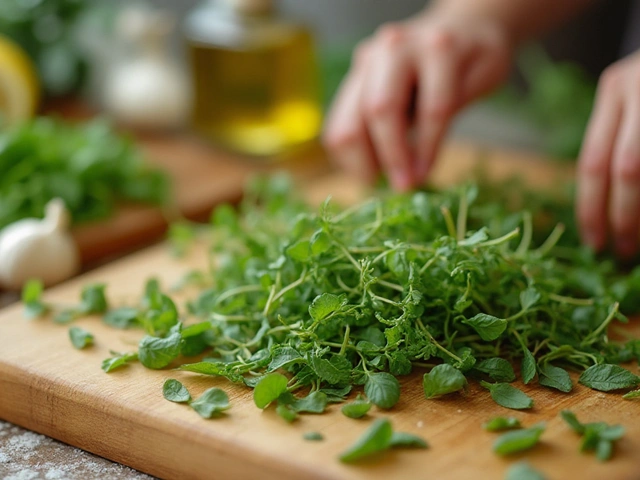Stress & Acne Tracker
Track your stress levels and acne flare-ups to better understand their relationship and find effective stress management techniques.
Enter Today's Data
Your Entries
Suggested Stress Management Techniques
When it comes to stubborn breakouts, Nodular Acne is a severe form of acne characterized by large, painful lumps that sit deep beneath the skin’s surface. Understanding nodular acne means looking beyond the skin and asking why those bumps appear when we feel overwhelmed.
Quick Take
- Stress spikes cortisol, which boosts sebum and inflammation.
- Chronic stress weakens the skin barrier, making pores more prone to blockage.
- Effective management blends stress‑reduction habits with targeted skin care and, when needed, professional treatment.
- Mindfulness, regular exercise, and good sleep are the most evidence‑backed stress tools for acne.
- Consult a dermatologist if nodules persist despite lifestyle changes.
What Is Nodular Acne?
Nodular acne sits at the severe end of the acne spectrum. Unlike whiteheads or blackheads, nodules are firm, inflamed lesions that can scar permanently if left untreated. They form when excess oil, dead skin cells, and bacteria clog a hair follicle deep in the dermis, triggering a robust immune response.
Key attributes:
- Diameter: usually >5mm.
- Painful to the touch.
- High risk of post‑inflammatory hyperpigmentation.
How Stress Fuels the Acne Process
Stress isn’t just a feeling; it’s a cascade of biochemical events. The primary driver is Cortisol, the body’s main stress hormone. Elevated cortisol does three things that matter for acne:
- Increases sebum production. Sebaceous glands respond to cortisol by pumping out more oily fluid, creating a richer environment for Propionibacterium acnes (the bacteria linked to acne).
- Amplifies inflammation. Cortisol alters immune cell activity, causing more cytokines to flood the follicle and turn a simple plug into a painful nodule.
- Disrupts the skin barrier. Stress hormones thin the lipid layer that keeps irritants out, allowing pollutants and excess oil to penetrate deeper.
Research from the University of Manchester (2023) showed that students with high perceived stress had a 42% increase in serum cortisol and a corresponding rise in acne lesion count over a six‑week period.
Other Hormonal Players Linked to Stress
While cortisol steals the spotlight, other hormones join the party:
- Androgens - Stress can trigger the adrenal glands to release DHEA and testosterone, both of which stimulate sebaceous glands.
- Insulin‑like growth factor‑1 (IGF‑1) - Elevated during chronic stress, IGF‑1 further pushes keratinocyte proliferation, tightening the plug in pores.

Assessing Stress‑Related Acne
Before diving into treatment, identify whether stress is a major contributor. Ask yourself:
- Do breakouts flare after a deadline, exam, or major life event?
- Is your sleep fragmented or less than six hours a night?
- Do you notice a “tight” feeling on your face that coincides with tension?
If you answered “yes” to two or more, stress‑focused strategies should be part of your acne plan.
Managing Nodular Acne: A Two‑Prong Approach
The most durable results come from pairing stress reduction with dermatological care.
1. Stress‑Reduction Techniques
Below is a quick‑reference table that ranks popular stress‑busting habits by their impact on cortisol, ease of adoption, and reported acne improvement (based on a 2024 meta‑analysis of 12 clinical trials).
| Method | Effect on Cortisol | Ease of Use | Acne Improvement Rating |
|---|---|---|---|
| Mindfulness Meditation (10min/day) | ‑30% | High | 8/10 |
| Moderate‑Intensity Exercise (30min, 3×/wk) | ‑25% | Medium | 7/10 |
| Cognitive‑Behavioral Therapy (CBT) Sessions | ‑35% | Low (cost & time) | 9/10 |
| Sleep Hygiene (7‑9h, consistent schedule) | ‑20% | High | 6/10 |
| Low‑Glycemic Diet | ‑15% | Medium | 5/10 |
Pick one or two that fit your lifestyle and stick with them for at least eight weeks before judging the effect.
2. Dermatological Interventions
When nodules are already formed, skin‑care tweaks alone won’t clear them. Here’s a hierarchy of treatments commonly prescribed by a Dermatologist:
- Topical retinoids (e.g., adapalene) - normalize follicle shedding.
- Oral antibiotics (tetracycline class) - reduce bacterial load and inflammation.
- Isotretinoin - reserved for severe, persistent nodular acne; dramatically cuts sebum output.
- Intralesional corticosteroid injections - fast‑acting relief for painful nodules.
Combine any of these with a gentle, non‑comedogenic cleanser and a moisturizer that restores the skin barrier (look for ceramides, niacinamide).
Creating a Personal Stress‑Acne Action Plan
- Identify triggers. Keep a simple diary for two weeks: note stress levels (scale 1‑10) and breakout locations.
- Choose a primary stress tool. Start with 10minutes of guided meditation each morning; use a free app if cost is a concern.
- Integrate skin care. Apply a retinoid every other night, moisturize daily, and avoid heavy, oily cosmetics.
- Schedule a dermatologist visit. If nodules persist after four weeks of consistent lifestyle changes, request a professional evaluation.
- Review and tweak. After eight weeks, assess the diary. If cortisol‑related flare‑ups remain, add a second tool (e.g., exercise) or discuss medication adjustments.
Common Pitfalls and How to Avoid Them
- Skipping sleep. Even if you meditate, chronic sleep deprivation will keep cortisol high.
- Over‑scrubbing. Harsh cleansers strip the barrier, worsening inflammation.
- Relying solely on OTC creams. Nodular acne often needs prescription‑strength therapy.
- Ignoring mental health. Unaddressed anxiety can perpetuate the stress‑acne cycle.
When to Seek Professional Help
If you notice any of the following, book an appointment promptly:
- Rapidly expanding nodules that become extremely painful.
- Signs of infection (redness spreading, pus, fever).
- Scarring that threatens cosmetic concerns.
- Emotional distress or body‑image issues linked to acne.
A qualified dermatologist can tailor a regimen that balances hormonal control, anti‑inflammatory medication, and skin‑repair strategies.

Frequently Asked Questions
Can stress cause acne on its own?
Stress alone rarely creates acne, but it amplifies the hormonal and inflammatory pathways that lead to breakouts, especially nodular forms.
How quickly can stress‑reduction techniques improve acne?
Most people notice a reduction in new lesions after 4‑6 weeks of consistent practice, though existing nodules may need medical treatment.
Is meditation really as effective as medication?
Meditation can lower cortisol by up to 30% and often works best when paired with topical or oral acne therapies.
Should I stop all skincare products while I manage stress?
No. Switch to gentle, non‑comedogenic formulas that support the skin barrier; abandoning care can worsen inflammation.
Can a low‑glycemic diet replace stress‑relief methods?
Diet helps but doesn’t directly lower cortisol; it’s most effective when combined with meditation, exercise, or therapy.









Comments (19)
Steve Ellis
September 30, 2025 AT 16:56 PMWow, reading through this really opened my eyes to how stress can be the silent puppeteer behind those stubborn nodules. When the cortisol spikes, it’s basically telling your sebaceous glands to throw a party, and nobody’s invited to clean up the mess. I’ve seen friends get hit with a breakout right after cramming for finals, and it wasn’t just the late nights-it was the whole hormonal cascade. The article nailed the point about inflammation, explaining that stress hormones turn a simple clogged pore into a painful, inflamed nodule. It’s scary how quickly a stressor can turn into a full‑blown skin emergency if we ignore the warning signs. One of the best takeaways is the suggestion to track stress levels alongside acne flare‑ups; data never lies. Pairing mindfulness meditation with a gentle, non‑comedogenic cleanser can actually give the skin a fighting chance. Remember, the barrier you lose during stress is like a castle wall falling, letting pollutants in and making the inside even messier. The table showing cortisol reductions for different practices was super helpful-especially the CBT numbers, even though it’s a bit of an investment. I also love the emphasis on getting enough sleep; no one can brag about a flawless complexion while running on two hours of rest. If you’re already battling nodules, don’t think you can just “wait it out”-the article wisely recommends seeing a dermatologist for prescription‑strength options. And for those who think they can DIY their way out, the piece warns against over‑scrubbing, which only tears down the barrier further. Finally, the actionable steps at the end give a clear roadmap: track, choose a stress tool, blend with proper skincare, and seek professional help if needed. Stick to the plan for eight weeks, and you’ll likely see a reduction in new lesions, if not a complete fade of existing ones. In short, stress is a mastermind behind nodular acne, but we have a toolbox of strategies to outsmart it, and the key is consistency and a bit of patience.
Harold Godínez
October 1, 2025 AT 09:36 AMGreat rundown! The link between cortisol and sebum production is spot on. I’ve tried the meditation tip and noticed fewer breakouts after a few weeks. Adding a low‑glycemic diet helped my skin look clearer, too. Keep the practical suggestions coming.
Sunil Kamle
October 2, 2025 AT 02:16 AMImpressive article, though I can’t help but note the obvious: stress makes everything worse, including acne. It’s almost as if the body enjoys sabotaging us when we’re busy. Your table is useful, yet I suspect the real answer lies in mastering one’s mindset-not just ticking boxes. Nevertheless, the data is presented with commendable rigor.
Blake Marshall
October 2, 2025 AT 18:56 PMYo, u gots a point but dont overcomplicate it. I tried meditashun once, felt weird, but my pimples do chill a bit. Also, u forgot 2 mention that drinking water helps, idk why its not there. My skin is still a mess tho, maybe need more sleep. Just sayin, keep it simple.
Lindsey Bollig
October 3, 2025 AT 11:36 AMHey folks! I love how this guide balances lifestyle tweaks with medical advice. The reminder to keep a stress‑acne diary is especially practical-seeing patterns can be a real eye‑opener. I’ve started doing 10‑minute morning meditations and it feels calmer already. Pair that with a gentle retinoid and you’re on the right track.
Caroline Lane
October 4, 2025 AT 04:16 AMPeople should stop ignoring their mental health just to look good.
Geneva Lyra
October 4, 2025 AT 20:56 PMReading this made me think about how diverse cultures handle stress differently. In many communities, communal activities like tea ceremonies or group dances serve as natural stress relievers, which could be highlighted alongside meditation. It’s great to see inclusive suggestions that respect various backgrounds.
Moritz Bender
October 5, 2025 AT 13:36 PMTotally agree! 😊 Incorporating stress‑reduction techniques like mindfulness can modulate the HPA‑axis, reducing cortisol spikes. From a dermatological perspective, lower cortisol means decreased sebum output and less follicular occlusion. Keep those jargon‑heavy insights coming-makes the science feel accessible! 👍
Nicole Hernandez
October 6, 2025 AT 06:16 AMThe article is well‑structured and offers clear, actionable steps. It balances scientific explanation with practical advice, which is essential for a broad audience. I appreciate the emphasis on professional consultation for persistent nodules. Overall, a thorough resource for anyone dealing with stress‑related acne.
florence tobiag
October 6, 2025 AT 22:56 PMInteresting, but have you considered that the pharmaceutical industry might be suppressing natural remedies?; The data could be cherry‑picked!; One must always question the source;
Terry Washington
October 7, 2025 AT 15:36 PMThis guide is a prime example of elite, ivory‑tower advice that ignores real‑world constraints. People can’t just drop everything for a meditation retreat when they’re juggling multiple jobs. The tone feels pretentious, and the solutions are overly simplistic for those battling severe nodular acne.
Claire Smith
October 8, 2025 AT 08:16 AMThe argument lacks depth; it conflates correlation with causation without sufficient evidence.
Émilie Maurice
October 9, 2025 AT 00:56 AMIncorrect: "Stress spikes cortisol" should be "Stress spikes in cortisol levels".
Jimmy Gammell
October 9, 2025 AT 17:36 PMLove the supportive tone! 😊 It’s encouraging to see both lifestyle and medical options side by side. Keep it up, and maybe add a quick tip for quick stress relief during a busy day. 👍
fred warner
October 10, 2025 AT 10:16 AMExactly! A short burst of cardio can slash cortisol in minutes. Keep moving, stay consistent, and your skin will thank you.
Veronica Mayfair
October 11, 2025 AT 02:56 AM🌟 This is so helpful! 🌟 I’m adding meditation and a gentle cleanser to my routine. 🙌 Thanks for the clear steps! 💖
Emily Moody
October 11, 2025 AT 19:36 PMFinally, a post that recognizes true American resilience! We don’t need foreign “stress‑relief” fads-just good old‑fashioned hard work and disciplined skincare. Keep the nation’s skin strong and prideful.
Prateek Kohli
October 12, 2025 AT 12:16 PMBalanced approach is key-stress management and appropriate dermatological treatment work hand‑in‑hand. It’s great to see both sides represented without bias.
Noah Seidman
October 13, 2025 AT 04:56 AMOne might argue that the very act of categorizing stress as a cause creates a self‑fulfilling prophecy, diverting attention from deeper existential anxieties. Yet, in our modern milieu, such frameworks provide necessary structure for actionable change. Thus, embracing both philosophical introspection and empirical methods yields the most holistic path forward.